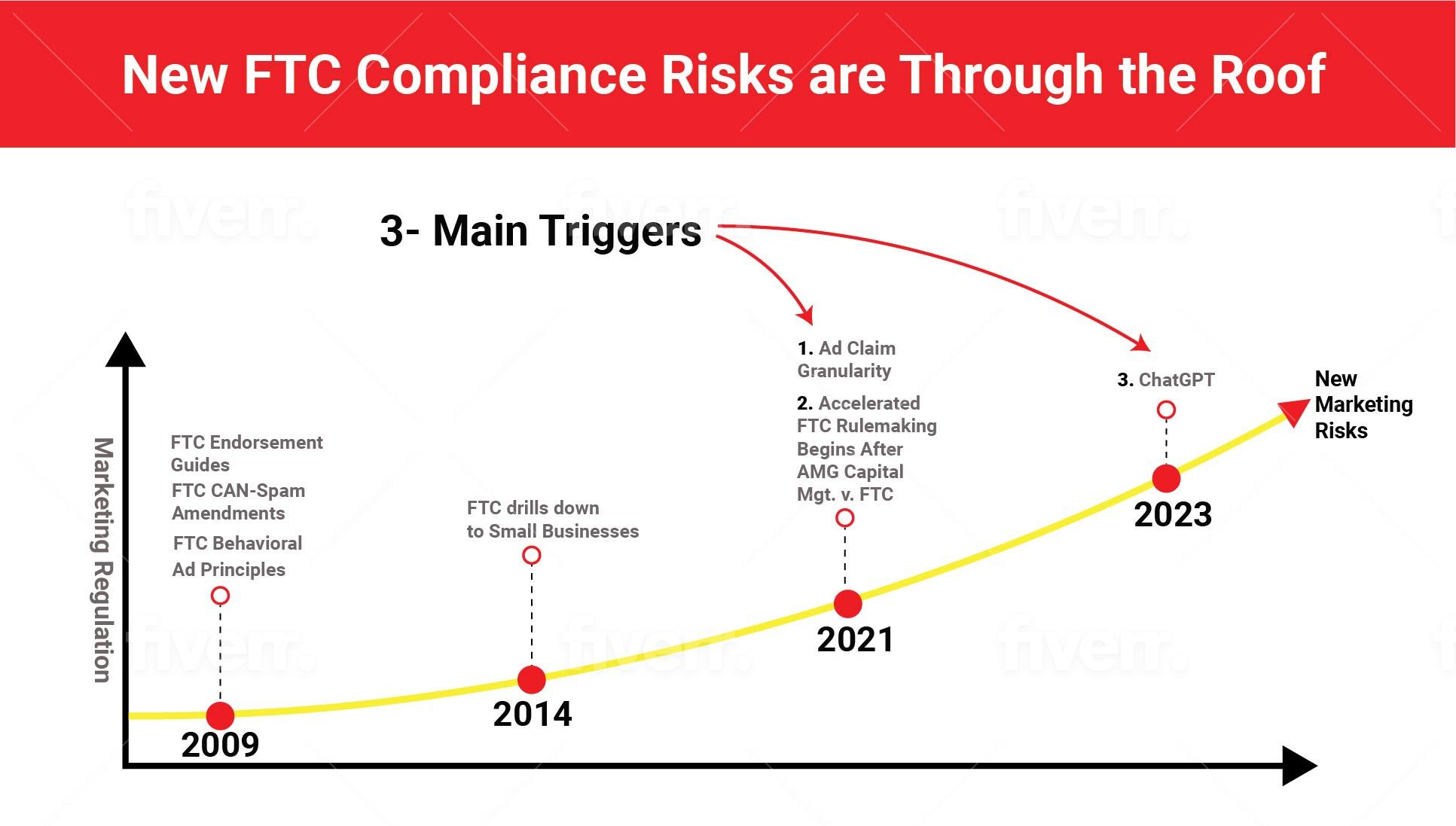#1 in FTC Compliance Coaching
Legal Protection For Your Online Business
The Internet's Most Advanced ‘Next Generation' Online Compliance & SaaS Document Generation Platform, Plus Easy-To-Understand Rules of The Road And Strategies!
FTC Fires Warning Shot to Marketers Who Use ChatGPT for
Digital Advertising or Sell AI-Enabled Products and Services
If we haven't made it obvious yet, FTC staff is focused intensely on how companies may choose to use AI technology, including new generated AI tools, in ways that can have actual and substantial impact on consumers.
FTC Blog Post, May 1, 2023
Consumer Rights Regarding AI
FTC: These Rights are “Fundamental”
1. The right to know they're being advertised to: "It should always be clear that an ad is an ad."
2. The right to know whether search results or any generative AI output is “organic... or is paid.”...
Monitoring & Impact of AI Tools
FTC Regulations May Require Marketers to:
“Monitor and address the actual use and impact of any [AI] tools eventually deployed.”
The FTC Warns Marketers Regarding Ad Claims For AI-Integrated Products
“AI” is an Ambiguous Term
"One thing we know about hot marketing terms is that some advertisers won’t be able to stop themselves from overusing and abusing them."
Efficacy Advertising Claims for AI-Enabled Products & Services
Will Products Work as Advertised?
"For FTC enforcement purposes, false unsubstantiated claims about a product’s efficacy are our bread and butter."
Exaggeration of AI-Enabled Products/Services
Performance Claims are Deceptive if they:
* Lack scientific support, or
* Apply only to certain types of users or under certain conditions
Comparison Claims for AI-Enabled Products/Services
Comparison Against Non-AI Product/Service
* Do you claim that your AI-enabled product is better than non-AI product?
* "You need adequate proof for that kind of comparative claim."
Risks of AI-Enabled Products/Services
Are Marketers Aware of the Risks?
* "You need to know about the reasonably foreseeable risks and impact" of AI-Enabled products
* "Can't blame the developer if something goes wrong or it yields biased results".
* "Can't say you're not responsible."
Ad Claim: “Product in AI-Enabled”
Does Product Really Use AI?
Baseless claims that mention a product is AI-enabled can result in an FTC enforcement action. "Merely using an AI tool in the development process is not the same as a product having AI in it."
FTC Substantiation Requirements
3 Steps You Need to Follow
Step 1: Consider the Product (and the Type of Ad Claim)
Certain products are subject to specific regulations such as food and dietary supplements...
The FTC Requires Substantiation of the Net Impression of all Advertising Claims
6 Elements of Net Impression
Net impression is the overall advertising message/takeaway understood by reasonable consumers, not what the advertiser intends the message to be.
These elements are what you need to evaluate...
Comparative Advertising Claims
Are Comparative Ad Claims Legal?
Digital marketers often seek to position their products against a competitor’s products.
These claims are known as comparative claims because they claim either that the advertisers’...
Unqualified Advertising Claims
FTC: Unqualified Advertising Claims are High Risk!
What are unqualified Ad Claims?
- Very broad claims,
- That don’t provide information for the basis of the claim...
Do You Use Influencers
on Social Media to
Provide Credibility for Your Promotions?
FTC v. TEAMI
Influencers are persons who have developed a significant following on social media platforms.
Deceptive practices by influencers on social media are a top-priority concern of the FTC...
Do You Post Videos to Social Media Comparing Your Product to a Competitor's Product?
COORS v. BUD
Comparative advertising is a marketing strategy in which a marketer's product is presented as equal to or superior when compared to a competitor's product. Comparative advertising often involves a side-by-side comparison of the two products...
FTC Guardian™ Has You Covered
MEMBER ONLY COACHING
- Connect with Chip on Live twice per month
- Learn to navigate the new compliance risks
INTELLIGENT DOCUMENT GENERATOR
- 80+ Legal Documents
- Website Protection
- Marketing
- Promotion
- Intellectual Property
LEGAL COMPLIANCE BLUEPRINT
- Blueprint explains legal compliance step by step
TRUST SEAL RIGHTS
- Enhance confidence with prospects and customers
- Pop up certificate verifies membership agreement to follow FTC regulations and Code of Conduct
ENTERPRISE LEVEL MEMBERSHIP
- Licensing: Enterprise Members generate income by licensing use of the FTC Guardian™ Platform to their clients for generation of website protection
What If FTC Compliance Could Become A Marketing Asset?
We Believe It Can!
After all, the pace of FTC enforcement has steadily increased since 2009, and it will continue at an increasing rate into the foreseeable future.
Your customers and prospects are becoming more aware of Privacy regulation. And they're also more aware of regulations affecting membership sites, continuity plans, and deceptive marketing.
FTC Guardian Members are authorized to display the Verified Member Trust Seal.
Display of the FTC Guardian Trust Seal could inspire trust in your prospects and customers.
As an FTC Guardian Member, you're required to comply with our Code of Conduct which states in part that you are committed to comply with rules and regulations regarding truth in advertising, including FTC decisions and regulations for:
- Online Advertising Claims
- Online Advertising Disclosures
- Continuity Plan Disclosures
- Testimonials and Endorsement Disclaimers
Privacy and Data Security of Personal Information.
Click on Logo
Member Testimonials
Chip Cooper, Internet Attorney




